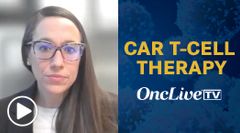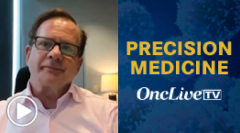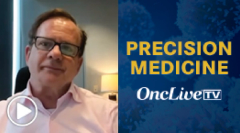
Inside the Clinic: JTCC Experts Share Strategies for When CAR T-Cell Therapy Is Not an Option
Lori A. Leslie, MD, and Andre H. Goy, MD, share strategies for when CAR T-cell therapy is not an option.
Episodes in this series

Lori A. Leslie, MD, assistant professor, Hackensack Meridian School of Medicine, director, Indolent Lymphoma and Chronic Lymphocytic Leukemia Research Programs, John Theurer Cancer Center, and Andre H. Goy, MD, physician in chief of the Hackensack Meridian Health Oncology Care Transformation Services, chairman and chief physician officer at John Theurer Cancer Center at Hackensack University Medical Center, and Lymphoma Division Chief at the John Theurer Cancer Center, share strategies for when CAR T-cell therapy is not an option.
The patient population that is ineligible for CAR T-cell therapy is shrinking because of improved toxicity management and intervention, Leslie says. Now, referring providers may be surprised by which patients are eligible for CAR T-cell therapy. As such, it is important to evaluate patients at a CAR T-cell therapy center. However, for patients who are not eligible for CAR T-cell therapy, more options have become available. For example, in diffuse large B-cell lymphoma, agents such as tafasitamab-cxix (Monjuvi), selinexor (Xpovio), and loncastuximab tesirine-lpyl (Zynlonta) are approved for use. Currently, these agents are not curative, although they have shown high response rates, Goy says.
For patients who are eligible for both CAR T-cell therapy and novel agents, treatment is typically sequenced such that novel agents are used following CAR T-cell therapy failure, Leslie says. However, regimens that incorporate novel agents into up-front treatment are also being explored. For example, the phase 3 POLARIX trial (NCT03274492) evaluated the addition of the antibody-drug conjugate polatuzumab vedotin-piiq (Polivy) to rituximab (Rituxan), cyclophosphamide, doxorubicin, and prednisone. These agents are also being incorporated into existing treatment regimens as a bridge to CAR T-cell therapy, Leslie says.
In terms of investigational therapeutics, bispecific T-cell engagers have garnered significant excitement and have shown encouraging responses post CAR T-cell therapy, Leslie says. However, because these agents are more easily administered than CAR T-cell therapy, a key question is whether these agents will replace CAR T-cell therapy in certain scenarios, Leslie concludes.








































